Good news everyone. The long-awaited final chapter of the Antemios Scottish trilogy has been completed and will soon be available for your reading pleasure.

Rome AARisen - a Byzantine AAR
- Thread starter General_BT
- Start date
-
We have updated our Community Code of Conduct. Please read through the new rules for the forum that are an integral part of Paradox Interactive’s User Agreement.
You are using an out of date browser. It may not display this or other websites correctly.
You should upgrade or use an alternative browser.
You should upgrade or use an alternative browser.
@AlexanderPrimus Excellent, looking forward to it 
@BT's overview
Europe sure looks interesting. Not quite as messy as one would think. Hungary cut loose from the empire is a logical development of Andronikos' victory, but are the Arpads still in charge there or is it another family?
Also what is the status of the Burgundians' hold on the German kingdom? On the map the visible fringes (Austria, Brandenburg) look like they're colored in the typical German green-gray of CK. That could imply that the kingdom is consolidated again
@BT's overview
Europe sure looks interesting. Not quite as messy as one would think. Hungary cut loose from the empire is a logical development of Andronikos' victory, but are the Arpads still in charge there or is it another family?
Also what is the status of the Burgundians' hold on the German kingdom? On the map the visible fringes (Austria, Brandenburg) look like they're colored in the typical German green-gray of CK. That could imply that the kingdom is consolidated again
Good news everyone. The long-awaited final chapter of the Antemios Scottish trilogy has been completed and will soon be available for your reading pleasure.
Yes! I am a bit sad it's the final one, but still, can't wait to read it!
I suspect he's just using the "" tags.
I also am a Gabriel-fanboy, but I cooled on him after he lost perspective (and the crown) with the German seductress. Honestly, he could have been a truly enlightened (if perhaps a bit belligerent) ruler...at least he's sired a so far exceptionally competent, free-thinking dynasty.
I hope Persia becomes a beacon of light and learning in the darkness which will soon descend on Romanion.
Wouldn't it be ironic if Persia becomes one of the few safe havens for the works of the ancient Greeks as Europe descends into chaos?
Hey everyone!
I know I promised in depth replies, but I’m rushing to get this posted before I have to go to work, since I know everyone wants to read the end of AlexanderPrimus’ Antemios Trilogy! So in lieu of full on replies, I’ll give some general responses to the larger themes that have been raised so far:
On Europe: I’ll answer those questions with the next map interims, one for Western Europe, one for Central Europe. I had to keep them close to my chest because they have some spoilers from the Scottish trilogy embedded in them.
Bohemia was just a nasty snafu… the Kingdom of Bohemia ended up in Finland, but they lost their ducal title and a new Duchy of Bohemia arose in the old lands. Weird, odd and confusing yes. I will admit, I cleaned up the map a little to consolidate things… on the actual CK map, Germany had a few scattered provinces along the Volga, and the Byzantines had individual counties from Russia to the British isles (vassals inheriting). I like my map more.
On Romanion and the Length of the Civil Wars – I tried to leave that spoiler intentionally vague on that regard… you’ll have to see how long this mess lasts, exactly.
On Mali: This Mali is kind of a combination of Mali and Songhai, with a longer development time beforehand, as well as less of a threat from Morocco. It is awesome, and it’ll be playable in EU3.
Welshdude – Welcome to the story! To answer your questions:
1. I’ve constantly promised to go back and do the what ifs, but I’ve simply run out of time. Someday, somehow, they’ll get finished, and that’s one I’d like to add to the list.
2. A tagma’s size depends on what period you are in the story. Earlier on the tagma was the historical size—however many troops came from its original theme. All the troops raised in Byzantion in game would be considered the Byzantion tagma. It wasn’t until about the reigns of Manuel and Basil that we saw a different, semi-standardized tagma as a regiment arise. These varied but at their peak under Thomas II they were up to 3-4,000 strong per tagma, at least on paper. This arrangement then gave way recently in the story to much smaller tagma, only 1,500-2,000 per unit under the Nikephoran Reforms.
3. You can only play characters that have a title. If the heir has no title, then no.
4. Yes.
5. Which Alexios? Alexios, father of Demetrios was a murder… he was slowly poisoned after he was wounded. Alexios I, Emperor of the West died of old age….
6. I just use image tags:

On Timur: Like I’ve said before, I think everyone will be amused a little by Timur. He will rock this story’s world, but perhaps not in the way/for the reasons you might assume…
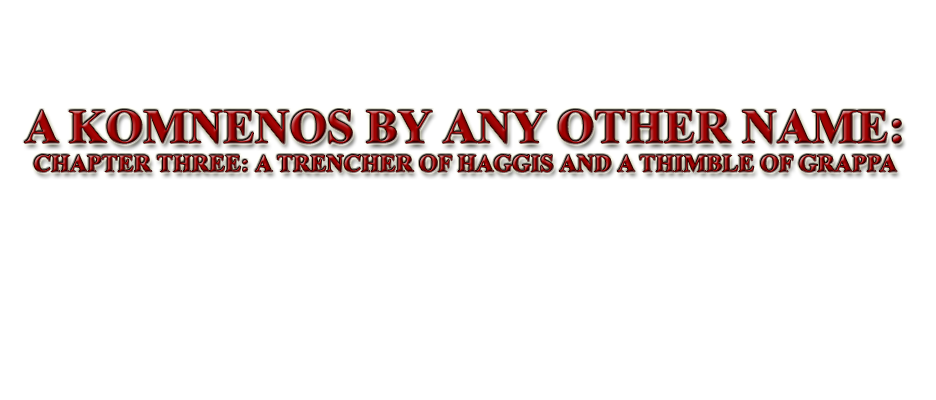
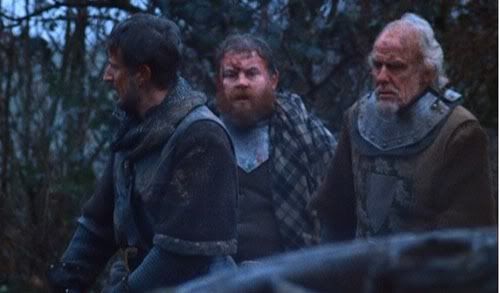
21 August 1271
Near Scarborough, Yorkshire
“The Norse… have betrayed me?” spluttered Antemios. No amount of grappa in the world could make this problem go away.
“My laird? I bring urgent news!” cried the page.
“YES?!” snapped Antemios, as if waking out of a stupor, “What? What is it now?”
“The French have begun their advance!”
Casting his gaze downward to the battlefield, Antemios could only see a tremendous cloud of dust rising from the plain. Then, as wider and wider rays of sunlight continued to break through the clouds, he thought he saw the silver gleam of armor—the armor of ten thousand galloping French knights.
“What shall I tell my Laird the Earl of Carrick?” persisted the page.
“Tell him to hold, of course!” barked Antemios, “This changes nothing!” He shook his head, desperately trying to concentrate. How could anybody think straight with irascible little pages shouting their name all day?
Then it came to him. It was a gamble, but it just might work.
“Wait!”
“My laird?” the page looked uncertain, worried even. He probably thought he was about to get a smack on the head.
“Send word to John Comyn in Dunfermline. Have him gather together as many golden bezants as he can. From merchants, clerics, usurers, it doesn’t matter! He can use silver from the royal treasury to compensate them. But only the bezants, do you hear? Nothing but smiling Roman faces.”
“Seneschal!” roared Antemios. Where was that man? He’d been there just a moment before. What good was it to have a personal staff if they were never around when you needed them?
“My Lord Regent?” Antemios turned his head to see a lanky, grey-haired man hurrying towards him, fastening on his cloak as he came. “You… you called for me?”
“Indeed,” Antemios frowned, “Master Balliol, I have a task for you.”
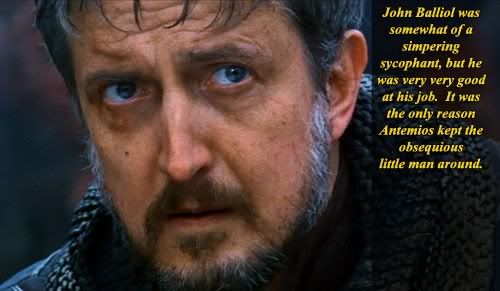
“I need you to make sure the men don’t hear about this business with the Norse, at least until after we’re done with the French. Tell any witnesses they had better keep their mouths tightly shut. Bind and gag those fool page boys if you have to.” Actually that wasn’t such a bad idea. It’d stop those little idiots from pestering him for a while.
“Ah, milord…” gulped John Balliol, “The French… and the Norse… Together. Do you… do you think we have any chance at all?”
“Well, you’d better sharpen your sword, that’s for sure,” Antemios didn’t feel very reassuring at the moment, “And it might be a good time to repent of your sins, just in case.” It was no use lying to the man, anyway.
Antemios grimaced at the sudden sound of Balliol being sick in the bushes. “A hundred thousand Scots in the world with iron stomachs and I get stuck with the queasy one,” muttered Antemios.
“Wha…what milord?” stuttered Balliol, wiping his mouth with the back of his sleeve.
“Look,” said Antemios, beginning to pity the terrified seneschal, “If we live through the night, remind me to introduce you to my favorite drink. I managed to get some imported before the French invaded. It’s called grappa. You’ll enjoy it.” And God knows you’ll need it after today, he added in his mind.
“Will that be all, milord?”
“There is one last thing, actually. Send word to my daughter Basilea. If she doesn’t hear from us again within seven days time, she is to take the young king to seek refuge at the Irish monastery that was previously agreed upon. Is that plain?”
“Grandfather…”
Now that was an odd thing for the seneschal to say.
“Grandfather?”
6 April 1297
Dunfermline, Fifeshire
“Grandfather, you’re awake!”
The venerable Antemios opened his eyes to see the smiling face of his granddaughter, Queen Siobhán of Scotland, also known to some as Ioanna Komnenos de Bruce.
“Why the fuss, girl?” said Antemios, “I was only resting my eyes. Bah, when you’re my age all you have to do is take a little nap and everybody thinks you’re dead!”
“He’s awake?” said a male voice, “That’s wonderful!”
“Eh?” mumbled Antemios, “Who’s that?”
“You don’t recognize me after all this time, my lord?” The newcomer was a tall man, with reddish-golden locks that matched the gold and crimson coat of arms upon his breast.
“Ah, my king! How kind of you to come and visit a foolish old man. What an unexpected pleasure to see you!”
“The pleasure is mine,” said the King.
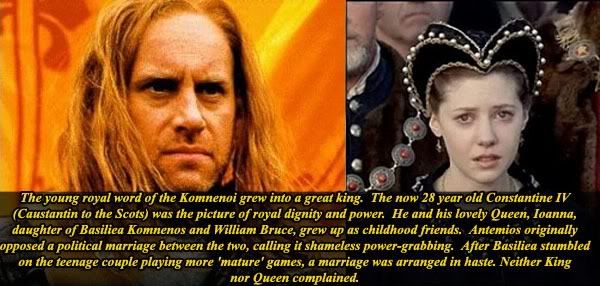
“I must admit,” continued Causantín, “My reasons for coming to see you are partly selfish. I’ve come to ask your advice on something.”
“He lies,” said Siobhán, giggling, “My husband’s barely left your side in days.”
“And what can an old codger do for a hale and hearty young king like yourself?” said Antemios.
“The time has come at last to make the grand announcement. The one my father was planning all those years ago before he died.”
Antemios laughed. “Do you mean to tell me, my boy, that at long last you’ve decided to take on the mantle of High King of Britain?”
“I have,” said Causantín, smiling, “The time is right. Scotland is strong, our enemies are divided, and our people are ready to embrace their destiny.”
“That’s all well and good,” said Antemios, “But the real question is, are you ready to embrace your destiny? This will change everything.”
Causantín looked thoughtful. Antemios grabbed him by the wrist. “For you,” he whispered to the King, “And for you, my dear.” He took his granddaughter’s hand. “I think you’re both ready, but it will not be as easy as you think.”
“My laird…” Antemios heard a familiar voice call out to him.
“What was that?” he asked, “I think one of those idiot pageboys is looking for me again.”
“I don’t hear anything,” said the King.
“My laird…” When would those annoying pages learn to stop addressing him in that manner?
“Will somebody tell that wretched page to shut up?” groaned Antemios, “He’s driving me batty!”
“Grandfather?” said Siobhán, sounding more than a little alarmed, “There’s nobody in the room but us.”
“My laird!” came the voice again, and the shapes and colors of Antemios’ bedroom seemed to blur together before his very eyes.
24 August 1271
Near Ravenscar, Yorkshire
“My laird, the Norse leader awaits you in the pavilion,” said the page boy.
“Here goes nothing,” said Antemios, “Come on, gentlemen, let’s get this over with.” Balliol and Bruce nodded in agreement and followed the Lord Regent into the big tent.
“I presume I have the pleasure of addressing Hákon Hákonsson, Prince of Norway, Jarl of Trondheim?”
The Norse chief was a big, burly man, with long blonde hair and a bushy beard. He gave Antemios a wry grin.
“You forgot Krigleder of all the warbands of the North,” he grunted.
“A thousand apologies,” responded Antemios in monotone, his face an emotionless slate.
At that, Jarl Hákon laughed heartily, a loud, raucous noise. “They said you were from Miklagard, and I see now that they were right. Such manners!” The gathered Norsemen all shared a hearty laugh.
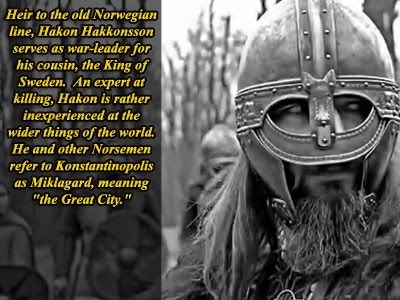
“I understand that congratulations are in order,” continued Hákon, “You bested those sorry Frenchmen quite soundly. Not that you will fare so well against our doughty Vikings!”
“Yes, about that,” said Antemios, “I’m confident that we can reach an amicable agreement that will be beneficial to us both, without resorting to any… unpleasantries.”
“I received your message,” chuckled Hákon, “But I don’t know what you expect to gain from a parley. The Kejsar was quite insistent that I was only to agree to your acceptance of the terms he proposed.”
“Bring in the chest!” Antemios called through the tent flap. Two brawny Scots entered, bearing a large oaken coffer. Antemios flung the lid open, and revealed hundreds of gleaming golden solidii.
“In token of our new arrangement,” said Antemios, “I bring you this trove of treasure. Two thousand golden bezants!”
“Ah, very shiny!” grinned Hákon, “My thanks for the gift, but you have yet to relate any details of this ‘new’ arrangement.”
“Well,” said Antemios, “Before I confirm the details, let me just add that there are thirteen more like this back at our camp.”
“Interesting,” the Viking raised a hairy brow, “But I recall that the Kejsar demanded one hundred thousand bezants. I’m no scholar, but thirteen times two doesn’t seem like it will be enough.”
“That’s because these bezants are not for the Kejsar. They are for the King of Jórvik.”
“The King of… where?” asked Hákon, somewhat befuddled.
“I am confident that my lord has heard the tales of his famous ancestor, Erik Bloodaxe, who ruled as king in this very place.”
“Erik… Bloodaxe?” Jarl Hákon obviously hadn’t paid attention in history class, “Of course, my great ancestor Erik Bloodaxe! His axe was the, um… bloodiest in all of Norway!”
“Indeed,” said Antemios, expertly keeping the derision out of his voice, “And he was also twice crowned as King of Jórvik.”
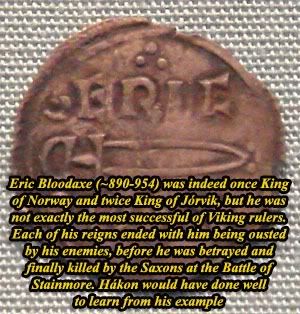
“What’s this? King, you say?” He had definitely gotten the big Viking’s attention now.
“Of Jórvik. Yorkshire. The land upon which you now stand.”
“What’s that have to do with me?” asked Hákon, “That’s all in the past. We live in the present day, and in the present you must kneel before the Kejsar of Sweden or die.”
“The King of Sweden has no rights here,” Antemios said mysteriously, “But if I were to swear allegiance to the awesome King of Norway, it would be another matter.”
“What’s this? Norway has no king. There has been no king ever since my grandfather knelt in obeisance to King Magnus years ago.”
“Norway does have a rightful king,” Antemios said deviously, “His name is Hákon IV, and he is standing right in front of me.”
“You would have me betray my cousin!” Hákon finally understood.
“I would have you claim what is rightfully yours! Too long has Norway followed in Sweden’s dark shadow. Rise up, demand what belongs to your blood!”
“This is dangerous talk,” said Hákon carefully, “And I will not deny that what you say appeals to me. But, no. Sweden is too powerful. No, I cannot rebel against my cousin without more support.”
“Did I not just say that Scotland and all its domains would kneel to you?” replied Antemios, “Norway once held sway over much of Britain. It can be so again. Moreover, I propose that you succeed your mighty ancestor as the great King of Jórvik. All lands north of the River Tweed will be your vassals, but everything to the south of the Tweed is yours to rule directly. You need only reach out your hand and take it. That is the right and the legacy of the King of Jórvik!”
“Truly,” said Hákon, “You make it sound so easy. But I have commanded the Swedish hosts in battle. Their armies are vast, their axes sharp. It will take more than this to make Norway free again.”
“Then lest you underestimate the support you shall receive in this endeavor,” said Antemios, “I have provided some… additional proof. Look at this—” Antemios pulled a long roll of parchment out of his sleeve. “That seal there is known as the Great Seal. It is the mark of the Emperor, and is belongs to him alone.”
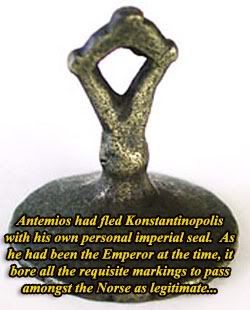
“Miklagard?” stammered Hákon.
“Indeed. Here, have a look for yourself.”
“I… um, I can’t read or write,” blustered the Viking, “Um… I mean, in Latin--yes. Can’t read Latin.”
“Well, fortunately for you,” said Antemios with a diplomatic smile, “This particular letter happens to be written in Greek. And I happen to know the Greek language most intimately. Let me read just a portion for you.”
Antemios unrolled the parchment with a theatrical flourish and cleared his throat loudly.
“My dear cousin,
It warms my heart indeed to hear that your endeavors have met with such success in the distant northern lands. Know that you have my full support in whatever designs you may yet undertake, be they political or mercantile. You have my profoundest thanks for furthering the interests of Konstantinopolis in even the bleakest of settings.”
Speechless, Jarl Hákon simply blinked.
“You’ll note that it is signed by the Emperor’s own hand,” said Antemios, pointing to the corresponding signature on the document, “Make no mistake. I enjoy the full support of the Roman Empire in all my undertakings. Did you think that those golden solidii just fell out of the sky? Or perhaps that they grew on trees?”
“Well,” said Hákon, “This does change things a bit.”
“I thought it might,” said Antemios, “So let me be the first to swear fealty to the new King of Norway and Jórvik!” He dropped to his knees and held out his hands in the manner of a supplicant.
Scottish and Viking jaws alike dropped to the floor as Antemios recited the traditional oath of fealty word for word.
“Now place your hands on mine, and accept my pledge,” continued Antemios, a hint of authority at last creeping back into his voice.
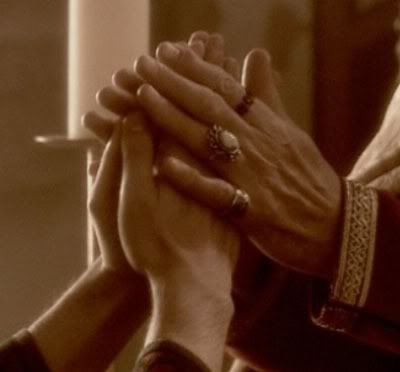
“Y-yes,” answered Hákon in amazement, “Of course. With the support of Miklagard, we cannot fail. Norway shall have a king again at last.”
“Long live the King,” said Antemios, putting a finger to his lips to hush the accolades of the Norse warriors.
“There will be trouble,” said Hákon, “So since Scotland is now my vassal, I call upon your arms.”
“And you shall have them,” said Antemios, “Look for our host to come to your aid in the morning.”
Having been silent up to that point, the Bruce quickly grabbed Antemios’ arm and gave him a hard look. “My Lord Regent,” he said dangerously, “I think you may be forgetting something.”
“Of course! How could I forget?” said, Antemios sneaking a quick wink to Bruce, “And afterwards we shall all go on a merry haggis hunt together!”
The Bruce raised an eyebrow.
“Surely my king has heard tales of the rare and inimitable Scots haggis?”
Bruce’s other eyebrow joined the first. Hákon looked perplexed. “The haggis?”
“That’s right, the wild haggis,” continued Antemios, “’Tis one of the many exotic woodland creatures that graces our fair highland kingdom. Is that not so, master Balliol?”
“It is so, milord,” said Balliol, his upper lip quivering ever so slightly, “They say… they say that its left legs are longer than its right legs so that it can run quickly along the steep and craggy moors.”
“Aye,” added Bruce, half a smile growing on his lips, “But that means it cannae run in more than one direction, so it makes for an easy kill. Mighty tasty, though.”

“You simply must join us on the traditional haggis hunt,” urged Antemios, “It is a traditional rite that every King of Scots had gone through prior to his coronation.”
“Very well then…” said Hákon, clearly still confused, “That would be most agreeable.”
“Now, with your permission, great king,” said Antemios, as fawningly as he could, “We shall depart and prepare our men for the morrow.”
Antemios’ words fell on deaf ears, however, for the Norsemen had already begun a mead-drinking contest in celebration.
“We’ll just let ourselves out then, shall we?” said Antemios.
Amazed at their good fortune, the Scottish delegation scurried away from the Norse pavilion as fast as their legs would carry them.
“A wild haggis hunt?” sneered Bruce, once they had reached the forest glade where their servants waited with the horses, “What on earth was that all about?”
“Just a clever backup plan,” coughed Antemios, still a little winded, “Just in case. Trust me.”
“What comes next, Lord Regent?” asked John Balliol.
“Aye,” said Bruce, “This master plan of yours had better work, else we’ve just signed away the kingdom to a half-wit Viking! And you! You swore to honor and obey him in all things!”
“Which is why you must relieve me of that burdensome oath on the morrow by ending his niggling life,” said Antemios, “Have a little faith in me, Earl William.”
“But our men are all tired and wounded,” said Balliol, “How can we defeat another army?”
“Here’s how,” said Antemios, “Call up the hobelars, the squires, even the horseboys. We need everyone who’s capable of handling a mount and a blade at the same time!”
“Horseboys? What good can they do against hordes of bloodthirsty Vikings?”
“A great deal, I think you’ll find, when said Vikings are already at each other’s throats!”
6 April 1297
Dunfermline, Fifeshire
Antemios stirred, but kept his eyes closed at the sound of voices. It was an old habit he’d picked up in Konstantinopolis. He’d found that most people were much more likely to speak freely in front of him if they thought he was asleep. Or drunk.
“It’s been over fifty years!” barked Causantín, “He’s on his deathbed and only now do they send an official envoy?”
“You’re telling me!” came the familiar brogue of William the Bruce, “We ought to give the messenger a stern flogging and send him on his way with his cloak rent!”
“That would be inadvisable, I think,” muttered the King, “Though I do appreciate your sentiment. There’s something about the messenger I can’t place, though. His clothing is far too fine for an ordinary envoy, and his face has a noble cast to it. Something familiar… I just can’t place it. Mark my words though, there’s more going on here than meets the eye.”
“Aye,” growled the Bruce, “Damned Greek bastards sneaking around in the dark. Won’t ever say what’s really on their minds.”
Antemios crinkled his nose. Was that smoke he smelled? He thought about yelling a warning, but his lips didn’t seem to want to move.
“Let’s wait and see what the man has to say,” continued the King, “This may yet be an opportunity for us.”
Yes, that was definitely smoke. Why couldn’t those young whippersnappers smell it? Fire! Antemios called out in his mind. The wispy grey vapors encircled him before he could react any further.
25 August 1271
Near Ravenscar, Yorkshire
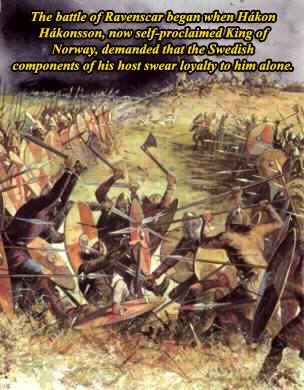
The Scots spotted the smoke rising from the burning Swedish camp from miles away. The caustic odor of burning flesh assailed Antemios’ nostrils with the potency of a hundred bonfires.
It was Balliol who spoke first. “Our spy reports that the Norse and the Swedes are joined in a furious battle for the kingship. The Norsemen are expecting us to honor our pact and provide them with reinforcements, while the Swedes remain oblivious to our involvement.”
“What happened?” asked Antemios, “I was expecting that that brute Hákonsson would try to arrest the Swedish leaders, or murder them in their beds or something, not start a civil war on the spot! I knew there’d be a fight eventually, but this? Stupid Varangians…”
“Vikings will be Vikings,” said William the Bruce, “We should’na be surprised that their first instinct is bloodshed. Even at the drop of a hat.”
“It’s really quite droll,” continued Balliol, stifling a little chuckle, “Hákon went straight to his cousin’s son, the Swedish Prince Olaf, and gave him the opportunity to swear his fealty. He said he was bound by honor to declare his intentions and give him every chance to submit.”
“I can’t imagine that went over very well,” said Antemios.
“Oh, it didn’t, young Prince Olaf demanded the right of holmgang then and there! Then Hákon’s supporters demanded the same of Olaf, whose supporters then challenged all of Hákon’s, and well, the result is yonder battle!”
“Well,” said Antemios with a sigh, “I suppose it’s about time that we present the Norsemen with their ‘reinforcements.’ Draw swords, boys! They’re expecting us. We don’t want to be late!”
With an ear-splitting warcry, Antemios spurred his horse forward, a teeming horde of screaming Scots following at his heels.
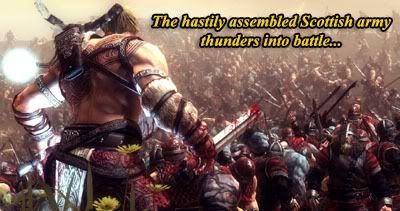
The embattled Norsemen caught their first glimpse of the Scottish horsemen as they crested the ridge overlooking the battle. Their Swedish opponents quailed in astonishment and fear.
“Den Skotske!” came the mighty cheer of the Norwegians, “Den Skotske!”
Their elation turned to shock and then to terror when the first Norseman was impaled by a Scottish lance.
6 April 1297
Dunfermline, Fifeshire
“Your Highness, I am an official envoy of the Emperor in Konstantinopolis. I bear a message for his Excellency, the Regent.” The messenger was a tall man, with wavy hair and a prominent mustache—he was obviously of Varangian or Sortmark extraction.
“You are most welcome here, envoy,” said King Causantín, “But alas, the Lord Regent is unwell. However, any message requiring his attention can most certainly be given to me.”
“My sincerest apologies sire, but it is a personal message for the Lord Regent. I was expressly told that I must deliver this message in his presence.”
Causantín raised his eyebrows in both surprise and amusement.
“Send him through,” wheezed Antemios, “I’m awake. I’ve been expecting him. For about five decades, actually.”
The well-dressed messenger ambled forward.
“I am Godwine Haroldson, eldest son of the Megas Domestikos,” said the envoy, “I hold in my hands a message addressed to you, Lord Antemios Komnenos, Regent of Scotland, bearing the seal of my master, Emperor Andronikos, Vice Gerent of Christ, Megas Komnenos of Romanion…”
“My, my,” said Antemios, choking back some phlegm, “Isn’t that a presumptuous little title. Is that what they’re calling him these days?”
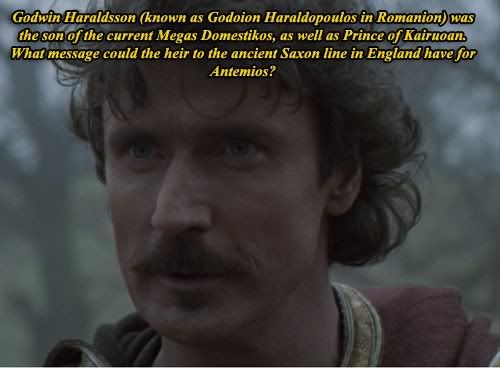
Haroldson’s lips moved in response, but no sound seemed to come from them.
“Eh, what was that?” said Antemios, “I’m an old man, you’ll have to speak up.”
“Lord Antemios?” Haroldson’s voice seemed distant, as if it had drifted on the wind across a great expanse, “I’ve come to tell you that the Emperor has graciously decided to present you with…”
The emissary’s voice grew softer and softer until all was completely silent.
25 August 1271
Near Ravenscar, Yorkshire
“My laird Comyn?!!” The page’s shouting seemed to reverberate with thunder in Antemios’ ears.
“What? What is it? For the love of Christ you don’t need to shout like that!” he bellowed back on sheer impulse. He paused, looking more closely at his surroundings.
Antemios found himself standing on the battlefield at Ravenscar, his blade still dripping with Scandinavian gore.
“Sire?” Blast it, he’d gone and scared the fool boy.
“It’s alright,” Antemios said more gently, “What do you need?”
“L-Lord Bruce sends his compliments,” said the boy, “He says you have utterly routed both the Norsemen and the Swedes. We are victorious. The last survivors are retreating to their ships.”
“What?” Antemios said sharply, “Tell him to stop them at once! Burn their damned ships! The only word that’s to get back to Norway from this battle is the message that I’ve especially prepared. What are you waiting for? Go, go!”
Antemios looked on while the boy scrambled back through the carnage.
He exhaled. “It just never ends, does it?” And yet, perhaps the long struggle was indeed over at last.
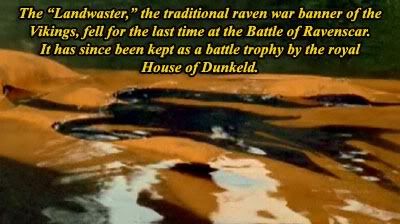
***6 April 1297
Dunfermline, Fifeshire
Antemios’ eyelids fluttered.
“I’ve arranged for him to be interred nearby at Dunfermline Abbey,” Causantín was saying, “Alongside the noble kings of the past. It’s a truly great honor. Do you think he’d want to know, dearest?”
“I doubt he’d want to be reminded that he’s dying, dear husband,” answered Siobhán, “Every moment that he’s awake is precious.”
“Mama?” said a tiny voice from behind. “Mama, is grandpapa going to be alright?”
“He’s going to be just fine,” said Siobhán, her voice catching in her throat a little, “But your great-grandfather needs his rest now. Run along back to bed, little one.”
“Wait… Ioanna…” Antemios managed to croak, “Let me see the lad.”
The little boy looked up at his mother hesitatingly.
“It’s alright, Alistair,” said Siobhán, “You heard your grandpapa.”
Tears pricked at the corners of his eyes as the little boy’s face came into view.
“Mama says that you’re going to go away soon,” squeaked the boy, “Please don’t go, grandpapa. I’ll miss you.”
With great effort, Antemios managed to reach up and gently tousle the child’s sandy blond hair.
“You’re a good boy, Alexandros,” he said, his voice barely more than a whisper, “And some day you will be a truly great king.”
Dunfermline, Fifeshire
The hour had grown late, and Antemios’ bed was surrounded by family and friends: his stalwart sons and their wives, his daughter Basilea and her husband William the Bruce, his granddaughter Siobhán and her husband the King.
“He’s gone,” said the physician quietly, “Died in his sleep.” For a moment the room was silent, save the stifled sniffles of his family.
“And thus a mighty lion passes out of our midst,” said King Causantín, a tear trailing down his cheek. “And those of us who remain are left…” he paused, catching his voice, “…bereaved.”
“Be at peace, dear grandfather,” whispered Queen Siobhán, gently moving a strand of white hair off of the departed man’s face, “And know that your legacy will live in on those who love you…in these walls, and throughout the kingdom…”
“In the old days, back in Konstantinopolis,” said Basilea, white hairs skirting her own head as tears openly ran down her cheeks, “I cried when we left! Thank you, father, for bringing us here. You… saved us…”
“He did much more than that,” added the Bruce. Even the brusque Scotsman’s voice was hitched, “He saved this country and its king. He saved us all. Time and time again, he saved us all. That doddery, grouchy, wine-bibbing old Greek was no Greek—he was a Scotsman, and a damned fine one.”
A hush fell over the noble little gathering as each remembered with fondness the life of the great man who had passed on.
And at long last, a smile rested on the lips of Antemios Komnenos.
I know I promised in depth replies, but I’m rushing to get this posted before I have to go to work, since I know everyone wants to read the end of AlexanderPrimus’ Antemios Trilogy! So in lieu of full on replies, I’ll give some general responses to the larger themes that have been raised so far:
On Europe: I’ll answer those questions with the next map interims, one for Western Europe, one for Central Europe. I had to keep them close to my chest because they have some spoilers from the Scottish trilogy embedded in them.
Bohemia was just a nasty snafu… the Kingdom of Bohemia ended up in Finland, but they lost their ducal title and a new Duchy of Bohemia arose in the old lands. Weird, odd and confusing yes. I will admit, I cleaned up the map a little to consolidate things… on the actual CK map, Germany had a few scattered provinces along the Volga, and the Byzantines had individual counties from Russia to the British isles (vassals inheriting). I like my map more.
On Romanion and the Length of the Civil Wars – I tried to leave that spoiler intentionally vague on that regard… you’ll have to see how long this mess lasts, exactly.
On Mali: This Mali is kind of a combination of Mali and Songhai, with a longer development time beforehand, as well as less of a threat from Morocco. It is awesome, and it’ll be playable in EU3.
Welshdude – Welcome to the story! To answer your questions:
1. I’ve constantly promised to go back and do the what ifs, but I’ve simply run out of time. Someday, somehow, they’ll get finished, and that’s one I’d like to add to the list.
2. A tagma’s size depends on what period you are in the story. Earlier on the tagma was the historical size—however many troops came from its original theme. All the troops raised in Byzantion in game would be considered the Byzantion tagma. It wasn’t until about the reigns of Manuel and Basil that we saw a different, semi-standardized tagma as a regiment arise. These varied but at their peak under Thomas II they were up to 3-4,000 strong per tagma, at least on paper. This arrangement then gave way recently in the story to much smaller tagma, only 1,500-2,000 per unit under the Nikephoran Reforms.
3. You can only play characters that have a title. If the heir has no title, then no.
4. Yes.
5. Which Alexios? Alexios, father of Demetrios was a murder… he was slowly poisoned after he was wounded. Alexios I, Emperor of the West died of old age….
6. I just use image tags:
On Timur: Like I’ve said before, I think everyone will be amused a little by Timur. He will rock this story’s world, but perhaps not in the way/for the reasons you might assume…


21 August 1271
Near Scarborough, Yorkshire
“The Norse… have betrayed me?” spluttered Antemios. No amount of grappa in the world could make this problem go away.
“My laird? I bring urgent news!” cried the page.
“YES?!” snapped Antemios, as if waking out of a stupor, “What? What is it now?”
“The French have begun their advance!”
Casting his gaze downward to the battlefield, Antemios could only see a tremendous cloud of dust rising from the plain. Then, as wider and wider rays of sunlight continued to break through the clouds, he thought he saw the silver gleam of armor—the armor of ten thousand galloping French knights.
“What shall I tell my Laird the Earl of Carrick?” persisted the page.
“Tell him to hold, of course!” barked Antemios, “This changes nothing!” He shook his head, desperately trying to concentrate. How could anybody think straight with irascible little pages shouting their name all day?
Then it came to him. It was a gamble, but it just might work.
“Wait!”
“My laird?” the page looked uncertain, worried even. He probably thought he was about to get a smack on the head.
“Send word to John Comyn in Dunfermline. Have him gather together as many golden bezants as he can. From merchants, clerics, usurers, it doesn’t matter! He can use silver from the royal treasury to compensate them. But only the bezants, do you hear? Nothing but smiling Roman faces.”
“Seneschal!” roared Antemios. Where was that man? He’d been there just a moment before. What good was it to have a personal staff if they were never around when you needed them?
“My Lord Regent?” Antemios turned his head to see a lanky, grey-haired man hurrying towards him, fastening on his cloak as he came. “You… you called for me?”
“Indeed,” Antemios frowned, “Master Balliol, I have a task for you.”

“I need you to make sure the men don’t hear about this business with the Norse, at least until after we’re done with the French. Tell any witnesses they had better keep their mouths tightly shut. Bind and gag those fool page boys if you have to.” Actually that wasn’t such a bad idea. It’d stop those little idiots from pestering him for a while.
“Ah, milord…” gulped John Balliol, “The French… and the Norse… Together. Do you… do you think we have any chance at all?”
“Well, you’d better sharpen your sword, that’s for sure,” Antemios didn’t feel very reassuring at the moment, “And it might be a good time to repent of your sins, just in case.” It was no use lying to the man, anyway.
Antemios grimaced at the sudden sound of Balliol being sick in the bushes. “A hundred thousand Scots in the world with iron stomachs and I get stuck with the queasy one,” muttered Antemios.
“Wha…what milord?” stuttered Balliol, wiping his mouth with the back of his sleeve.
“Look,” said Antemios, beginning to pity the terrified seneschal, “If we live through the night, remind me to introduce you to my favorite drink. I managed to get some imported before the French invaded. It’s called grappa. You’ll enjoy it.” And God knows you’ll need it after today, he added in his mind.
“Will that be all, milord?”
“There is one last thing, actually. Send word to my daughter Basilea. If she doesn’t hear from us again within seven days time, she is to take the young king to seek refuge at the Irish monastery that was previously agreed upon. Is that plain?”
“Grandfather…”
Now that was an odd thing for the seneschal to say.
“Grandfather?”
***
6 April 1297
Dunfermline, Fifeshire
“Grandfather, you’re awake!”
The venerable Antemios opened his eyes to see the smiling face of his granddaughter, Queen Siobhán of Scotland, also known to some as Ioanna Komnenos de Bruce.
“Why the fuss, girl?” said Antemios, “I was only resting my eyes. Bah, when you’re my age all you have to do is take a little nap and everybody thinks you’re dead!”
“He’s awake?” said a male voice, “That’s wonderful!”
“Eh?” mumbled Antemios, “Who’s that?”
“You don’t recognize me after all this time, my lord?” The newcomer was a tall man, with reddish-golden locks that matched the gold and crimson coat of arms upon his breast.
“Ah, my king! How kind of you to come and visit a foolish old man. What an unexpected pleasure to see you!”
“The pleasure is mine,” said the King.

“I must admit,” continued Causantín, “My reasons for coming to see you are partly selfish. I’ve come to ask your advice on something.”
“He lies,” said Siobhán, giggling, “My husband’s barely left your side in days.”
“And what can an old codger do for a hale and hearty young king like yourself?” said Antemios.
“The time has come at last to make the grand announcement. The one my father was planning all those years ago before he died.”
Antemios laughed. “Do you mean to tell me, my boy, that at long last you’ve decided to take on the mantle of High King of Britain?”
“I have,” said Causantín, smiling, “The time is right. Scotland is strong, our enemies are divided, and our people are ready to embrace their destiny.”
“That’s all well and good,” said Antemios, “But the real question is, are you ready to embrace your destiny? This will change everything.”
Causantín looked thoughtful. Antemios grabbed him by the wrist. “For you,” he whispered to the King, “And for you, my dear.” He took his granddaughter’s hand. “I think you’re both ready, but it will not be as easy as you think.”
“My laird…” Antemios heard a familiar voice call out to him.
“What was that?” he asked, “I think one of those idiot pageboys is looking for me again.”
“I don’t hear anything,” said the King.
“My laird…” When would those annoying pages learn to stop addressing him in that manner?
“Will somebody tell that wretched page to shut up?” groaned Antemios, “He’s driving me batty!”
“Grandfather?” said Siobhán, sounding more than a little alarmed, “There’s nobody in the room but us.”
“My laird!” came the voice again, and the shapes and colors of Antemios’ bedroom seemed to blur together before his very eyes.
***
24 August 1271
Near Ravenscar, Yorkshire
“My laird, the Norse leader awaits you in the pavilion,” said the page boy.
“Here goes nothing,” said Antemios, “Come on, gentlemen, let’s get this over with.” Balliol and Bruce nodded in agreement and followed the Lord Regent into the big tent.
“I presume I have the pleasure of addressing Hákon Hákonsson, Prince of Norway, Jarl of Trondheim?”
The Norse chief was a big, burly man, with long blonde hair and a bushy beard. He gave Antemios a wry grin.
“You forgot Krigleder of all the warbands of the North,” he grunted.
“A thousand apologies,” responded Antemios in monotone, his face an emotionless slate.
At that, Jarl Hákon laughed heartily, a loud, raucous noise. “They said you were from Miklagard, and I see now that they were right. Such manners!” The gathered Norsemen all shared a hearty laugh.

“I understand that congratulations are in order,” continued Hákon, “You bested those sorry Frenchmen quite soundly. Not that you will fare so well against our doughty Vikings!”
“Yes, about that,” said Antemios, “I’m confident that we can reach an amicable agreement that will be beneficial to us both, without resorting to any… unpleasantries.”
“I received your message,” chuckled Hákon, “But I don’t know what you expect to gain from a parley. The Kejsar was quite insistent that I was only to agree to your acceptance of the terms he proposed.”
“Bring in the chest!” Antemios called through the tent flap. Two brawny Scots entered, bearing a large oaken coffer. Antemios flung the lid open, and revealed hundreds of gleaming golden solidii.
“In token of our new arrangement,” said Antemios, “I bring you this trove of treasure. Two thousand golden bezants!”
“Ah, very shiny!” grinned Hákon, “My thanks for the gift, but you have yet to relate any details of this ‘new’ arrangement.”
“Well,” said Antemios, “Before I confirm the details, let me just add that there are thirteen more like this back at our camp.”
“Interesting,” the Viking raised a hairy brow, “But I recall that the Kejsar demanded one hundred thousand bezants. I’m no scholar, but thirteen times two doesn’t seem like it will be enough.”
“That’s because these bezants are not for the Kejsar. They are for the King of Jórvik.”
“The King of… where?” asked Hákon, somewhat befuddled.
“I am confident that my lord has heard the tales of his famous ancestor, Erik Bloodaxe, who ruled as king in this very place.”
“Erik… Bloodaxe?” Jarl Hákon obviously hadn’t paid attention in history class, “Of course, my great ancestor Erik Bloodaxe! His axe was the, um… bloodiest in all of Norway!”
“Indeed,” said Antemios, expertly keeping the derision out of his voice, “And he was also twice crowned as King of Jórvik.”

“What’s this? King, you say?” He had definitely gotten the big Viking’s attention now.
“Of Jórvik. Yorkshire. The land upon which you now stand.”
“What’s that have to do with me?” asked Hákon, “That’s all in the past. We live in the present day, and in the present you must kneel before the Kejsar of Sweden or die.”
“The King of Sweden has no rights here,” Antemios said mysteriously, “But if I were to swear allegiance to the awesome King of Norway, it would be another matter.”
“What’s this? Norway has no king. There has been no king ever since my grandfather knelt in obeisance to King Magnus years ago.”
“Norway does have a rightful king,” Antemios said deviously, “His name is Hákon IV, and he is standing right in front of me.”
“You would have me betray my cousin!” Hákon finally understood.
“I would have you claim what is rightfully yours! Too long has Norway followed in Sweden’s dark shadow. Rise up, demand what belongs to your blood!”
“This is dangerous talk,” said Hákon carefully, “And I will not deny that what you say appeals to me. But, no. Sweden is too powerful. No, I cannot rebel against my cousin without more support.”
“Did I not just say that Scotland and all its domains would kneel to you?” replied Antemios, “Norway once held sway over much of Britain. It can be so again. Moreover, I propose that you succeed your mighty ancestor as the great King of Jórvik. All lands north of the River Tweed will be your vassals, but everything to the south of the Tweed is yours to rule directly. You need only reach out your hand and take it. That is the right and the legacy of the King of Jórvik!”
“Truly,” said Hákon, “You make it sound so easy. But I have commanded the Swedish hosts in battle. Their armies are vast, their axes sharp. It will take more than this to make Norway free again.”
“Then lest you underestimate the support you shall receive in this endeavor,” said Antemios, “I have provided some… additional proof. Look at this—” Antemios pulled a long roll of parchment out of his sleeve. “That seal there is known as the Great Seal. It is the mark of the Emperor, and is belongs to him alone.”

“Miklagard?” stammered Hákon.
“Indeed. Here, have a look for yourself.”
“I… um, I can’t read or write,” blustered the Viking, “Um… I mean, in Latin--yes. Can’t read Latin.”
“Well, fortunately for you,” said Antemios with a diplomatic smile, “This particular letter happens to be written in Greek. And I happen to know the Greek language most intimately. Let me read just a portion for you.”
Antemios unrolled the parchment with a theatrical flourish and cleared his throat loudly.
“My dear cousin,
It warms my heart indeed to hear that your endeavors have met with such success in the distant northern lands. Know that you have my full support in whatever designs you may yet undertake, be they political or mercantile. You have my profoundest thanks for furthering the interests of Konstantinopolis in even the bleakest of settings.”
Speechless, Jarl Hákon simply blinked.
“You’ll note that it is signed by the Emperor’s own hand,” said Antemios, pointing to the corresponding signature on the document, “Make no mistake. I enjoy the full support of the Roman Empire in all my undertakings. Did you think that those golden solidii just fell out of the sky? Or perhaps that they grew on trees?”
“Well,” said Hákon, “This does change things a bit.”
“I thought it might,” said Antemios, “So let me be the first to swear fealty to the new King of Norway and Jórvik!” He dropped to his knees and held out his hands in the manner of a supplicant.
Scottish and Viking jaws alike dropped to the floor as Antemios recited the traditional oath of fealty word for word.
“Now place your hands on mine, and accept my pledge,” continued Antemios, a hint of authority at last creeping back into his voice.

“Y-yes,” answered Hákon in amazement, “Of course. With the support of Miklagard, we cannot fail. Norway shall have a king again at last.”
“Long live the King,” said Antemios, putting a finger to his lips to hush the accolades of the Norse warriors.
“There will be trouble,” said Hákon, “So since Scotland is now my vassal, I call upon your arms.”
“And you shall have them,” said Antemios, “Look for our host to come to your aid in the morning.”
Having been silent up to that point, the Bruce quickly grabbed Antemios’ arm and gave him a hard look. “My Lord Regent,” he said dangerously, “I think you may be forgetting something.”
“Of course! How could I forget?” said, Antemios sneaking a quick wink to Bruce, “And afterwards we shall all go on a merry haggis hunt together!”
The Bruce raised an eyebrow.
“Surely my king has heard tales of the rare and inimitable Scots haggis?”
Bruce’s other eyebrow joined the first. Hákon looked perplexed. “The haggis?”
“That’s right, the wild haggis,” continued Antemios, “’Tis one of the many exotic woodland creatures that graces our fair highland kingdom. Is that not so, master Balliol?”
“It is so, milord,” said Balliol, his upper lip quivering ever so slightly, “They say… they say that its left legs are longer than its right legs so that it can run quickly along the steep and craggy moors.”
“Aye,” added Bruce, half a smile growing on his lips, “But that means it cannae run in more than one direction, so it makes for an easy kill. Mighty tasty, though.”

“You simply must join us on the traditional haggis hunt,” urged Antemios, “It is a traditional rite that every King of Scots had gone through prior to his coronation.”
“Very well then…” said Hákon, clearly still confused, “That would be most agreeable.”
“Now, with your permission, great king,” said Antemios, as fawningly as he could, “We shall depart and prepare our men for the morrow.”
Antemios’ words fell on deaf ears, however, for the Norsemen had already begun a mead-drinking contest in celebration.
“We’ll just let ourselves out then, shall we?” said Antemios.
Amazed at their good fortune, the Scottish delegation scurried away from the Norse pavilion as fast as their legs would carry them.
“A wild haggis hunt?” sneered Bruce, once they had reached the forest glade where their servants waited with the horses, “What on earth was that all about?”
“Just a clever backup plan,” coughed Antemios, still a little winded, “Just in case. Trust me.”
“What comes next, Lord Regent?” asked John Balliol.
“Aye,” said Bruce, “This master plan of yours had better work, else we’ve just signed away the kingdom to a half-wit Viking! And you! You swore to honor and obey him in all things!”
“Which is why you must relieve me of that burdensome oath on the morrow by ending his niggling life,” said Antemios, “Have a little faith in me, Earl William.”
“But our men are all tired and wounded,” said Balliol, “How can we defeat another army?”
“Here’s how,” said Antemios, “Call up the hobelars, the squires, even the horseboys. We need everyone who’s capable of handling a mount and a blade at the same time!”
“Horseboys? What good can they do against hordes of bloodthirsty Vikings?”
“A great deal, I think you’ll find, when said Vikings are already at each other’s throats!”
***
6 April 1297
Dunfermline, Fifeshire
Antemios stirred, but kept his eyes closed at the sound of voices. It was an old habit he’d picked up in Konstantinopolis. He’d found that most people were much more likely to speak freely in front of him if they thought he was asleep. Or drunk.
“It’s been over fifty years!” barked Causantín, “He’s on his deathbed and only now do they send an official envoy?”
“You’re telling me!” came the familiar brogue of William the Bruce, “We ought to give the messenger a stern flogging and send him on his way with his cloak rent!”
“That would be inadvisable, I think,” muttered the King, “Though I do appreciate your sentiment. There’s something about the messenger I can’t place, though. His clothing is far too fine for an ordinary envoy, and his face has a noble cast to it. Something familiar… I just can’t place it. Mark my words though, there’s more going on here than meets the eye.”
“Aye,” growled the Bruce, “Damned Greek bastards sneaking around in the dark. Won’t ever say what’s really on their minds.”
Antemios crinkled his nose. Was that smoke he smelled? He thought about yelling a warning, but his lips didn’t seem to want to move.
“Let’s wait and see what the man has to say,” continued the King, “This may yet be an opportunity for us.”
Yes, that was definitely smoke. Why couldn’t those young whippersnappers smell it? Fire! Antemios called out in his mind. The wispy grey vapors encircled him before he could react any further.
***
25 August 1271
Near Ravenscar, Yorkshire

The Scots spotted the smoke rising from the burning Swedish camp from miles away. The caustic odor of burning flesh assailed Antemios’ nostrils with the potency of a hundred bonfires.
It was Balliol who spoke first. “Our spy reports that the Norse and the Swedes are joined in a furious battle for the kingship. The Norsemen are expecting us to honor our pact and provide them with reinforcements, while the Swedes remain oblivious to our involvement.”
“What happened?” asked Antemios, “I was expecting that that brute Hákonsson would try to arrest the Swedish leaders, or murder them in their beds or something, not start a civil war on the spot! I knew there’d be a fight eventually, but this? Stupid Varangians…”
“Vikings will be Vikings,” said William the Bruce, “We should’na be surprised that their first instinct is bloodshed. Even at the drop of a hat.”
“It’s really quite droll,” continued Balliol, stifling a little chuckle, “Hákon went straight to his cousin’s son, the Swedish Prince Olaf, and gave him the opportunity to swear his fealty. He said he was bound by honor to declare his intentions and give him every chance to submit.”
“I can’t imagine that went over very well,” said Antemios.
“Oh, it didn’t, young Prince Olaf demanded the right of holmgang then and there! Then Hákon’s supporters demanded the same of Olaf, whose supporters then challenged all of Hákon’s, and well, the result is yonder battle!”
“Well,” said Antemios with a sigh, “I suppose it’s about time that we present the Norsemen with their ‘reinforcements.’ Draw swords, boys! They’re expecting us. We don’t want to be late!”
With an ear-splitting warcry, Antemios spurred his horse forward, a teeming horde of screaming Scots following at his heels.

The embattled Norsemen caught their first glimpse of the Scottish horsemen as they crested the ridge overlooking the battle. Their Swedish opponents quailed in astonishment and fear.
“Den Skotske!” came the mighty cheer of the Norwegians, “Den Skotske!”
Their elation turned to shock and then to terror when the first Norseman was impaled by a Scottish lance.
***
6 April 1297
Dunfermline, Fifeshire
“Your Highness, I am an official envoy of the Emperor in Konstantinopolis. I bear a message for his Excellency, the Regent.” The messenger was a tall man, with wavy hair and a prominent mustache—he was obviously of Varangian or Sortmark extraction.
“You are most welcome here, envoy,” said King Causantín, “But alas, the Lord Regent is unwell. However, any message requiring his attention can most certainly be given to me.”
“My sincerest apologies sire, but it is a personal message for the Lord Regent. I was expressly told that I must deliver this message in his presence.”
Causantín raised his eyebrows in both surprise and amusement.
“Send him through,” wheezed Antemios, “I’m awake. I’ve been expecting him. For about five decades, actually.”
The well-dressed messenger ambled forward.
“I am Godwine Haroldson, eldest son of the Megas Domestikos,” said the envoy, “I hold in my hands a message addressed to you, Lord Antemios Komnenos, Regent of Scotland, bearing the seal of my master, Emperor Andronikos, Vice Gerent of Christ, Megas Komnenos of Romanion…”
“My, my,” said Antemios, choking back some phlegm, “Isn’t that a presumptuous little title. Is that what they’re calling him these days?”

Haroldson’s lips moved in response, but no sound seemed to come from them.
“Eh, what was that?” said Antemios, “I’m an old man, you’ll have to speak up.”
“Lord Antemios?” Haroldson’s voice seemed distant, as if it had drifted on the wind across a great expanse, “I’ve come to tell you that the Emperor has graciously decided to present you with…”
The emissary’s voice grew softer and softer until all was completely silent.
***
25 August 1271
Near Ravenscar, Yorkshire
“My laird Comyn?!!” The page’s shouting seemed to reverberate with thunder in Antemios’ ears.
“What? What is it? For the love of Christ you don’t need to shout like that!” he bellowed back on sheer impulse. He paused, looking more closely at his surroundings.
Antemios found himself standing on the battlefield at Ravenscar, his blade still dripping with Scandinavian gore.
“Sire?” Blast it, he’d gone and scared the fool boy.
“It’s alright,” Antemios said more gently, “What do you need?”
“L-Lord Bruce sends his compliments,” said the boy, “He says you have utterly routed both the Norsemen and the Swedes. We are victorious. The last survivors are retreating to their ships.”
“What?” Antemios said sharply, “Tell him to stop them at once! Burn their damned ships! The only word that’s to get back to Norway from this battle is the message that I’ve especially prepared. What are you waiting for? Go, go!”
Antemios looked on while the boy scrambled back through the carnage.
He exhaled. “It just never ends, does it?” And yet, perhaps the long struggle was indeed over at last.

***
Dunfermline, Fifeshire
Antemios’ eyelids fluttered.
“I’ve arranged for him to be interred nearby at Dunfermline Abbey,” Causantín was saying, “Alongside the noble kings of the past. It’s a truly great honor. Do you think he’d want to know, dearest?”
“I doubt he’d want to be reminded that he’s dying, dear husband,” answered Siobhán, “Every moment that he’s awake is precious.”
“Mama?” said a tiny voice from behind. “Mama, is grandpapa going to be alright?”
“He’s going to be just fine,” said Siobhán, her voice catching in her throat a little, “But your great-grandfather needs his rest now. Run along back to bed, little one.”
“Wait… Ioanna…” Antemios managed to croak, “Let me see the lad.”
The little boy looked up at his mother hesitatingly.
“It’s alright, Alistair,” said Siobhán, “You heard your grandpapa.”
Tears pricked at the corners of his eyes as the little boy’s face came into view.
“Mama says that you’re going to go away soon,” squeaked the boy, “Please don’t go, grandpapa. I’ll miss you.”
With great effort, Antemios managed to reach up and gently tousle the child’s sandy blond hair.
“You’re a good boy, Alexandros,” he said, his voice barely more than a whisper, “And some day you will be a truly great king.”
***
7 April 1297Dunfermline, Fifeshire
The hour had grown late, and Antemios’ bed was surrounded by family and friends: his stalwart sons and their wives, his daughter Basilea and her husband William the Bruce, his granddaughter Siobhán and her husband the King.
“He’s gone,” said the physician quietly, “Died in his sleep.” For a moment the room was silent, save the stifled sniffles of his family.
“And thus a mighty lion passes out of our midst,” said King Causantín, a tear trailing down his cheek. “And those of us who remain are left…” he paused, catching his voice, “…bereaved.”
“Be at peace, dear grandfather,” whispered Queen Siobhán, gently moving a strand of white hair off of the departed man’s face, “And know that your legacy will live in on those who love you…in these walls, and throughout the kingdom…”
“In the old days, back in Konstantinopolis,” said Basilea, white hairs skirting her own head as tears openly ran down her cheeks, “I cried when we left! Thank you, father, for bringing us here. You… saved us…”
“He did much more than that,” added the Bruce. Even the brusque Scotsman’s voice was hitched, “He saved this country and its king. He saved us all. Time and time again, he saved us all. That doddery, grouchy, wine-bibbing old Greek was no Greek—he was a Scotsman, and a damned fine one.”
A hush fell over the noble little gathering as each remembered with fondness the life of the great man who had passed on.
And at long last, a smile rested on the lips of Antemios Komnenos.
***
Last edited:
Well, looks like he wasn't a lazy arse after all. Brilliant! 
And there he rest, the last living child of Thomas II.
And there he rest, the last living child of Thomas II.
An excellent piece! I loved it. I am eager to see how the quasi-Celtic kingdom in the British Isles is doing.
5. Which Alexios? Alexios, father of Demetrios was a murder… he was slowly poisoned after he was wounded. Alexios I, Emperor of the West died of old age….
Alexios, father of Demetrois. The start say this was about how the Komenids did without their poster boy, but how did you know he would die ingame?
BTW, what was the message given to Antemnios, there's probably a hint around here somewhere, but I can't remember it.
Marvellous! It seems Antemios leaves behind quite the legacy in Britain. I loved the "negotiations" with Håkon, full of great lines!
Bloodaxe was indeed among the less fortunate of the viking kings, the King Sagas imply that his wife hooked up with his half-brother...(Who incidentally was named Håkon)
By the way "Den skotske" is the singular form of "The scottish", the plural form would be "De skotske" or the more natural sounding "Skottene"
Bloodaxe was indeed among the less fortunate of the viking kings, the King Sagas imply that his wife hooked up with his half-brother...(Who incidentally was named Håkon)
By the way "Den skotske" is the singular form of "The scottish", the plural form would be "De skotske" or the more natural sounding "Skottene"
Last edited:
Wait, what was he awarded by Romaion?
Might well written, very touching! Thank you for giving us this side story, Alex.
Might well written, very touching! Thank you for giving us this side story, Alex.
As an added treat, here's the second of the map updates as well! As you will see, I was trying to hold back on it to make sure spoilers from AP's lovely interim weren't spilled before he was finished!
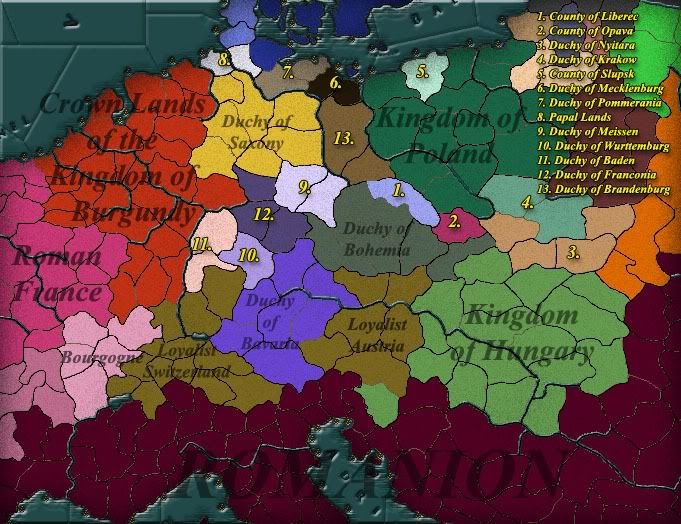
Next on the list of map regions to visit in Central Europe.
The dominant story of the last half century has been the rapid re-rise—and equally rapid re-collapse—of the old Arpad Empire. Mozes Arpad’s prestige in stopping the Mongol invasion at Krakow was enough to catapult him and his distaff lineage of the old Arpad imperial line back into the throne at Aachen. However, his great grandson Hesso lost the entire kingdom in one morning outside of Sisak in the Balkans.
In the complicated peace that followed Hesso’s ignominious end, the Papacy lost the right to name an Emperor—the only emperor recognized in Christendom would be the Megas Komnenos. The title ‘King of Italy’ was finally and irrevocably stripped from the title ‘King of Germany.’ As Hesso’s replacement (the hapless ex-Emperor was given a villa on Crete for himself and his immediate family to retire), Emperor Andronikos demanded the Papacy anoint Dietmar I, King of Burgundy, a friend of the Romanoi. The Papacy caved, and Germany’s problems grew even worse.
Grimaldi had been a sellsword early in his life—his claim to the Burgundian title was distant at best, and it was through force of arms alone that he gained the Bruges Crown. The great and powerful lords of Germany, who could trace lineages and titles to appointments from no less than Charlemagne, refused to kneel before someone so base and low. The Pressburg Arpads, yet another distaff branch of that ubiquitous family, immediately persuaded the magnates of Hungary to declare them Kings in their own right, while the Piasts in Bohemia declared their lands free as well, attempting to claim a Kingdom as well. Saxony, Bavaria, and most of central Germany followed suit. The rebels named Kalman Arpad, newly dubbed King of Hungary, as the new King of Germany. Dietmar called his troops, and war has raged since.
For the Papacy, the German civil war, coupled with the Swedish civil war, has given the Holy See a respite from outside danger that it desperately needed in the aftermath of the Franco-German debacle. The Papacy has repeatedly offered its services to mediate the disputes—an offer all parties so far have shunned. The Norwegians, Hungarians, Swedes and Burgundians know that for now, the Papacy is at its nadir—all four parties have used the opportunity to engage in a great deal of simony as well as other ‘adjustments’ to the lands of bishops and monasteries within their realms in order to finance their military campaigns. To let the See of St. Peter act as peacemaker, and abide by its decisions, would invite an increase in Papal prestige, as well as Papal meddling.
The war between Grimaldi, Arpad, and Piast still continues. Dietmar’s armies have secured Switzerland by force, and his son’s marriage to the daughter of Walther Welf, Duke of Austria, has kept that rich region under the Grimaldi banner. The Duke of Saxony has proven a far more able enemy than expected, however, and so far has stymied every attempt to bring the north of Germany under Grimaldi control. A confederation of south German principalities was steadily pushed back by Grimaldi in person, until Kalman Arpad and his Magyars intervened at the Battle of Wurms. Dietmar was narrowly defeated, but Kalman’s army was likewise left in bad way. Both sides have retired temporarily to gather more men.
Truly, it is a good time to be a mercenary in Europe.
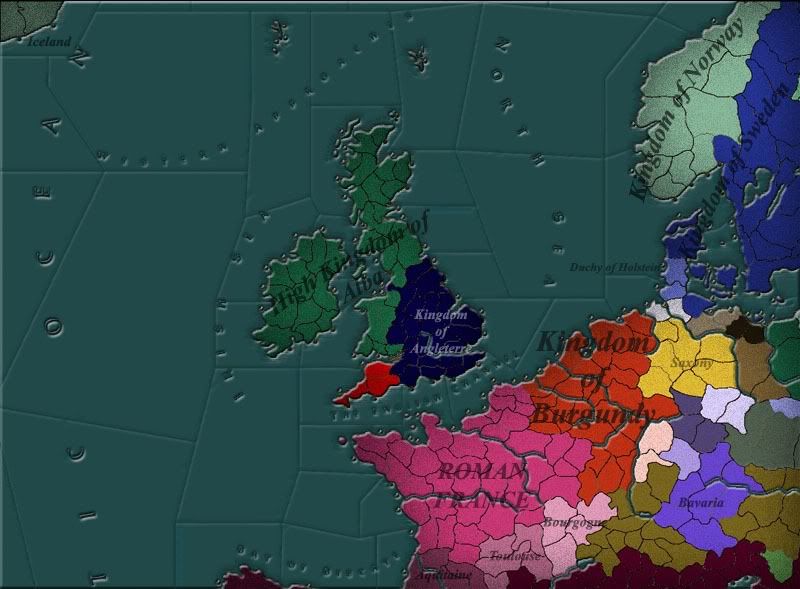
Next, we finally have the far west of Europe. The most notable change of the last century, of course, is the fall of Capetian France. In the south, the three Roman sebastokratorates continue—Aquitaine has remained powerful, but both Bourgogne and Toulouse have run afoul of the Hypatos, who through shrewd alliances with their northern neighbors, has cut them down slightly. Northern France remains a hodgepodge of counties and duchies, de jure answering to Konstantinopolis, but de facto independent.
Scotland managed to survive the scare of the century, defeating both a formidable French invasion led by Huges II Capet, then defeating a Swedish invasion force under Hakon Hakonsson. The latter conflict, along with some skullduggery on the part of Lord Protector Antemios Komnenos, provoked the Norwegian Jarls into breaking free from Sweden. Outside of Christiania in 1281, the Norwegians won their freedom in a hardfought battle that saw King Magnus IV of Sweden slain. The two sides have been at war almost constantly ever since, and the small Duchy of Schlieswig-Holstein has taken note of the chaos, and broken free of Swedish control.
The Capets still rule, however they only rule from London itself. As Capetian fortunes collapsed in the south, King Charles was forced to make concessions in the north—the Capets recognized Scotland’s claims on Wales, as well as the northern portions of Yorkshire and Lancashire in perpetuity. The border thus established by treaty, both sides have fallen into an uneasy peace—the Scottish King Constantine consolidating his realm and claiming the title “High King of Alba,” while Charles ingratiates himself with his Norman (and still French speaking) nobility. Constantine’s claim to the High Kingship implicitly declares his overlordship over the Capets—a situation that will undoubtedly provoke future conflict between the two powers in the British Isles.
To the south, the tiny, self-declared “King of the English” still rules in Cornwall and Cornwall alone. The former Dukes of Cornwall were old Saxon nobility that treacherous broke away from the Normans when convenient, and continued that behavior under the Capets. During the pinnacle of Hugues II Capet’s power, Duke Edward knelt freely, but as soon as the French declared war on the Romans, Edward broke free, intended to recreate the kingdom of his distant ancestors. Time will tell if this quixotic quest will end in glorious triumph, or as an inept footnote in history.
Once again, I’d like to thank AlexanderPrimus for agreeing to finish the story of Antemios Komnenos in far off Scotland! I’m only partially aware of all the trials he had to go through between starting that interim and finishing it (internet outages, graduate school midterms, and more), so I’d ask everyone to join me in giving him a standing ovation.
Finally, the next update is about 90% done… almost all of the text is finished, and part of the graphics are done. There are several new characters to introduce, and a civil war to roll out, so it’s rather long. Hopefully it will be finished and posted by this weekend for you guys. Thank you all for being patient!

Next on the list of map regions to visit in Central Europe.
The dominant story of the last half century has been the rapid re-rise—and equally rapid re-collapse—of the old Arpad Empire. Mozes Arpad’s prestige in stopping the Mongol invasion at Krakow was enough to catapult him and his distaff lineage of the old Arpad imperial line back into the throne at Aachen. However, his great grandson Hesso lost the entire kingdom in one morning outside of Sisak in the Balkans.
In the complicated peace that followed Hesso’s ignominious end, the Papacy lost the right to name an Emperor—the only emperor recognized in Christendom would be the Megas Komnenos. The title ‘King of Italy’ was finally and irrevocably stripped from the title ‘King of Germany.’ As Hesso’s replacement (the hapless ex-Emperor was given a villa on Crete for himself and his immediate family to retire), Emperor Andronikos demanded the Papacy anoint Dietmar I, King of Burgundy, a friend of the Romanoi. The Papacy caved, and Germany’s problems grew even worse.
Grimaldi had been a sellsword early in his life—his claim to the Burgundian title was distant at best, and it was through force of arms alone that he gained the Bruges Crown. The great and powerful lords of Germany, who could trace lineages and titles to appointments from no less than Charlemagne, refused to kneel before someone so base and low. The Pressburg Arpads, yet another distaff branch of that ubiquitous family, immediately persuaded the magnates of Hungary to declare them Kings in their own right, while the Piasts in Bohemia declared their lands free as well, attempting to claim a Kingdom as well. Saxony, Bavaria, and most of central Germany followed suit. The rebels named Kalman Arpad, newly dubbed King of Hungary, as the new King of Germany. Dietmar called his troops, and war has raged since.
For the Papacy, the German civil war, coupled with the Swedish civil war, has given the Holy See a respite from outside danger that it desperately needed in the aftermath of the Franco-German debacle. The Papacy has repeatedly offered its services to mediate the disputes—an offer all parties so far have shunned. The Norwegians, Hungarians, Swedes and Burgundians know that for now, the Papacy is at its nadir—all four parties have used the opportunity to engage in a great deal of simony as well as other ‘adjustments’ to the lands of bishops and monasteries within their realms in order to finance their military campaigns. To let the See of St. Peter act as peacemaker, and abide by its decisions, would invite an increase in Papal prestige, as well as Papal meddling.
The war between Grimaldi, Arpad, and Piast still continues. Dietmar’s armies have secured Switzerland by force, and his son’s marriage to the daughter of Walther Welf, Duke of Austria, has kept that rich region under the Grimaldi banner. The Duke of Saxony has proven a far more able enemy than expected, however, and so far has stymied every attempt to bring the north of Germany under Grimaldi control. A confederation of south German principalities was steadily pushed back by Grimaldi in person, until Kalman Arpad and his Magyars intervened at the Battle of Wurms. Dietmar was narrowly defeated, but Kalman’s army was likewise left in bad way. Both sides have retired temporarily to gather more men.
Truly, it is a good time to be a mercenary in Europe.

Next, we finally have the far west of Europe. The most notable change of the last century, of course, is the fall of Capetian France. In the south, the three Roman sebastokratorates continue—Aquitaine has remained powerful, but both Bourgogne and Toulouse have run afoul of the Hypatos, who through shrewd alliances with their northern neighbors, has cut them down slightly. Northern France remains a hodgepodge of counties and duchies, de jure answering to Konstantinopolis, but de facto independent.
Scotland managed to survive the scare of the century, defeating both a formidable French invasion led by Huges II Capet, then defeating a Swedish invasion force under Hakon Hakonsson. The latter conflict, along with some skullduggery on the part of Lord Protector Antemios Komnenos, provoked the Norwegian Jarls into breaking free from Sweden. Outside of Christiania in 1281, the Norwegians won their freedom in a hardfought battle that saw King Magnus IV of Sweden slain. The two sides have been at war almost constantly ever since, and the small Duchy of Schlieswig-Holstein has taken note of the chaos, and broken free of Swedish control.
The Capets still rule, however they only rule from London itself. As Capetian fortunes collapsed in the south, King Charles was forced to make concessions in the north—the Capets recognized Scotland’s claims on Wales, as well as the northern portions of Yorkshire and Lancashire in perpetuity. The border thus established by treaty, both sides have fallen into an uneasy peace—the Scottish King Constantine consolidating his realm and claiming the title “High King of Alba,” while Charles ingratiates himself with his Norman (and still French speaking) nobility. Constantine’s claim to the High Kingship implicitly declares his overlordship over the Capets—a situation that will undoubtedly provoke future conflict between the two powers in the British Isles.
To the south, the tiny, self-declared “King of the English” still rules in Cornwall and Cornwall alone. The former Dukes of Cornwall were old Saxon nobility that treacherous broke away from the Normans when convenient, and continued that behavior under the Capets. During the pinnacle of Hugues II Capet’s power, Duke Edward knelt freely, but as soon as the French declared war on the Romans, Edward broke free, intended to recreate the kingdom of his distant ancestors. Time will tell if this quixotic quest will end in glorious triumph, or as an inept footnote in history.
==========*==========
Once again, I’d like to thank AlexanderPrimus for agreeing to finish the story of Antemios Komnenos in far off Scotland! I’m only partially aware of all the trials he had to go through between starting that interim and finishing it (internet outages, graduate school midterms, and more), so I’d ask everyone to join me in giving him a standing ovation.
Finally, the next update is about 90% done… almost all of the text is finished, and part of the graphics are done. There are several new characters to introduce, and a civil war to roll out, so it’s rather long. Hopefully it will be finished and posted by this weekend for you guys. Thank you all for being patient!
Last edited by a moderator:
Truly, Shrewed Like a Norseman is not a compliment.
Also, Cornwall seems to include Devon. Duke Edward must be succeeding!
Excellent overview and Antemios update!
Also, Cornwall seems to include Devon. Duke Edward must be succeeding!
Excellent overview and Antemios update!
BT, I really hope you release the EU3 portion as a mod. Every time I return to this thread I go ga-ga over this incredible world you have created.
A fitting end to Antemios' story and a nice sitrep on the European scene. Its good to see that someone is finally fighting the dammed Swedes, now we just need a Danish rebellion and everything will be alright.
Two thing though:
1. The city of Christiania was called Oslo untill it burned in the 17th century and was rebuilt by a danish king called Christian IV who, being royally modest, named the place for himself.
2. @ Nehekara, "Den Skotske" is actually correct enough, remember the language is old norse not modern.
Two thing though:
1. The city of Christiania was called Oslo untill it burned in the 17th century and was rebuilt by a danish king called Christian IV who, being royally modest, named the place for himself.
2. @ Nehekara, "Den Skotske" is actually correct enough, remember the language is old norse not modern.
Roi d'Angleterre ? That's deliciously ironic. So, I guess that Notre Dame will be built on the riverside of Thames and Napoleon will be born in the Isle Of Man. Alternative history: priceless !!!

